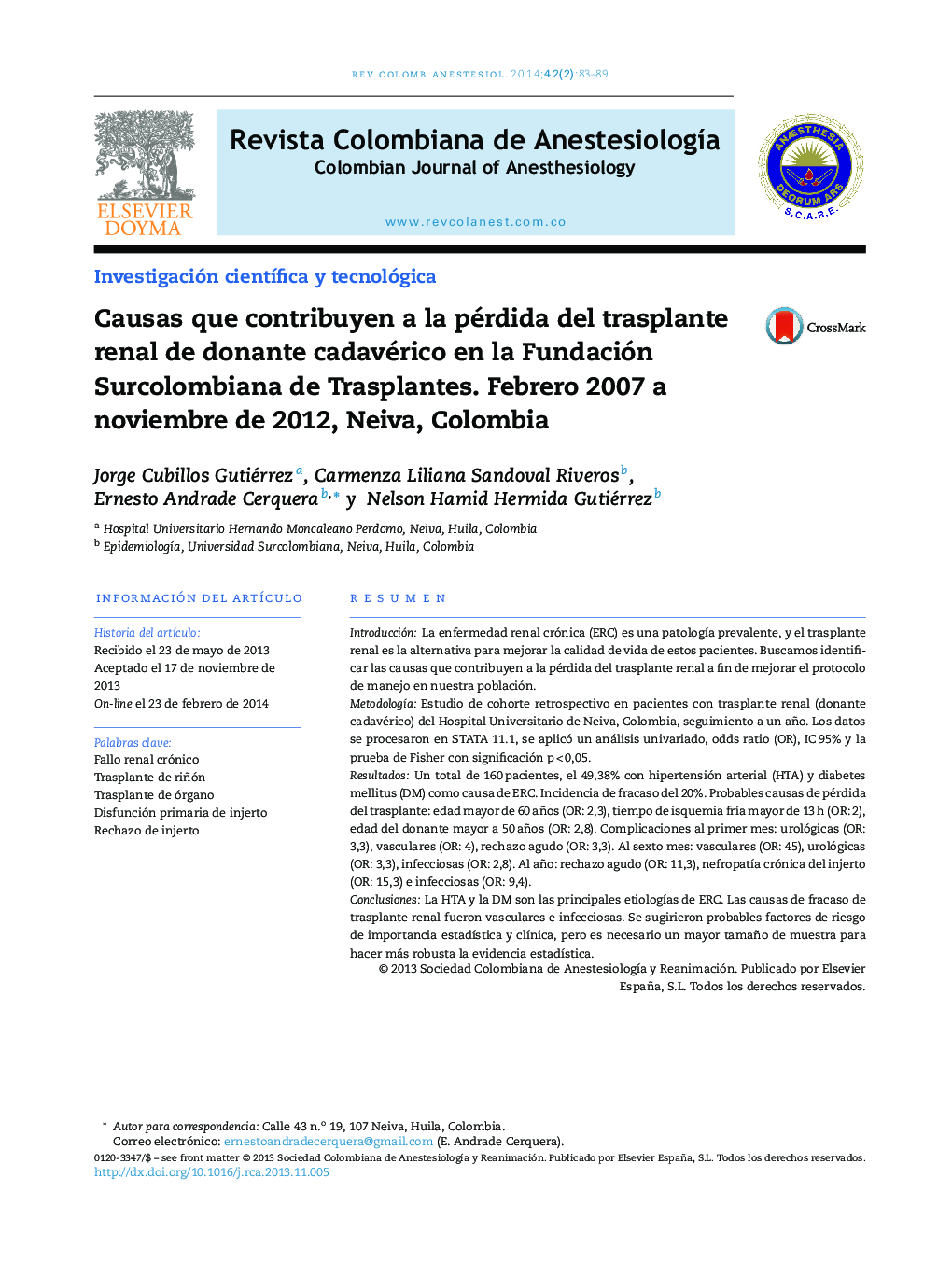| Article ID | Journal | Published Year | Pages | File Type |
|---|---|---|---|---|
| 2767866 | Revista Colombiana de Anestesiología | 2014 | 7 Pages |
ResumenIntroducciónLa enfermedad renal crónica (ERC) es una patología prevalente, y el trasplante renal es la alternativa para mejorar la calidad de vida de estos pacientes. Buscamos identificar las causas que contribuyen a la pérdida del trasplante renal a fin de mejorar el protocolo de manejo en nuestra población.MetodologíaEstudio de cohorte retrospectivo en pacientes con trasplante renal (donante cadavérico) del Hospital Universitario de Neiva, Colombia, seguimiento a un año. Los datos se procesaron en STATA 11.1, se aplicó un análisis univariado, odds ratio (OR), IC 95% y la prueba de Fisher con significación p < 0,05.ResultadosUn total de 160 pacientes, el 49,38% con hipertensión arterial (HTA) y diabetes mellitus (DM) como causa de ERC. Incidencia de fracaso del 20%. Probables causas de pérdida del trasplante: edad mayor de 60 años (OR: 2,3), tiempo de isquemia fría mayor de 13 h (OR: 2), edad del donante mayor a 50 años (OR: 2,8). Complicaciones al primer mes: urológicas (OR: 3,3), vasculares (OR: 4), rechazo agudo (OR: 3,3). Al sexto mes: vasculares (OR: 45), urológicas (OR: 3,3), infecciosas (OR: 2,8). Al año: rechazo agudo (OR: 11,3), nefropatía crónica del injerto (OR: 15,3) e infecciosas (OR: 9,4).ConclusionesLa HTA y la DM son las principales etiologías de ERC. Las causas de fracaso de trasplante renal fueron vasculares e infecciosas. Se sugirieron probables factores de riesgo de importancia estadística y clínica, pero es necesario un mayor tamaño de muestra para hacer más robusta la evidencia estadística.
IntroductionChronic kidney disease (CKD) is a prevalent dysfunction and renal transplant is the alternative for improving the lives of these patients. We seek to identify the factors that contribute to the loss of renal transplant in order to improve the management protocol in our population.MethodologyRetrospective cohort study in patients with renal transplantation (deceased donor) at Hospital Universitario de Neiva, Colombia, with a year of follow-up period. Data were processed in STATA 11.1, using univariate analysis, odds ratio (OR), (95% CI) and Fisher test, with p < 0.05 significance.ResultsIn 160 patients, 49.38% with arterial hypertension (HTN) and diabetes mellitus (DM) as the cause for CKD, there was 20% failure incidence. Probable causes of transplant loss: age over 60 (OR: 2.3); time of cold ischemia greater than 13 h (OR: 2); donor age greater than 50(OR: 2.8). One-month complications: urologic (OR: 3.3), vascular (OR: 4), acute rejection (OR:3.3). Six-month complications: vascular (OR: 4.5), urologic (OR: 3.3), infectious (OR: 2.8). One-year complications: acute rejection (OR: 11.3), chronic graft nephropathy (OR: 15.3), infection (OR: 9.4).ConclusionsArterial hypertension and DM are the main etiologies of CKD. The causes of renal transplant failure were mainly vascular and infectious. Probable risk factors of statistical and clinical importance were suggested but a larger sample size is required for more robust statistical evidence.
